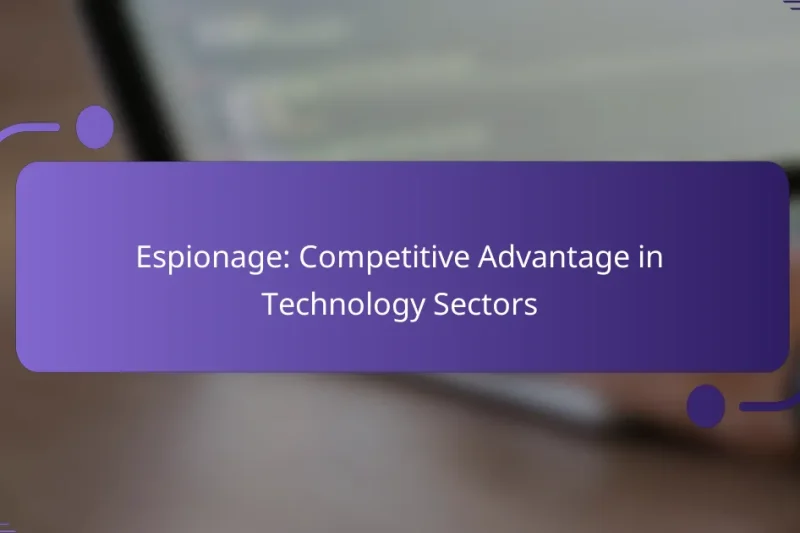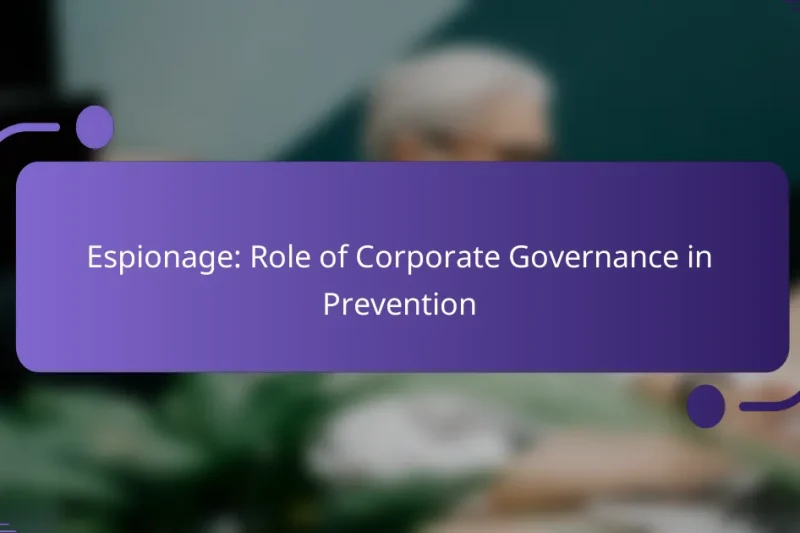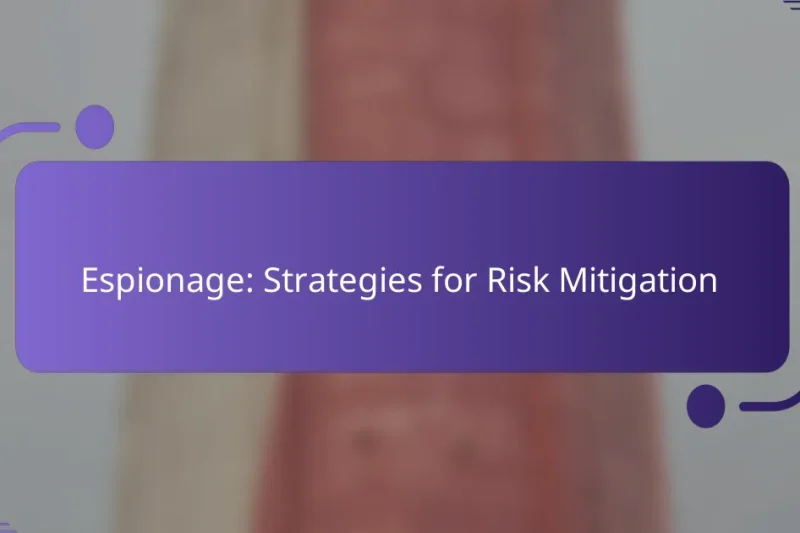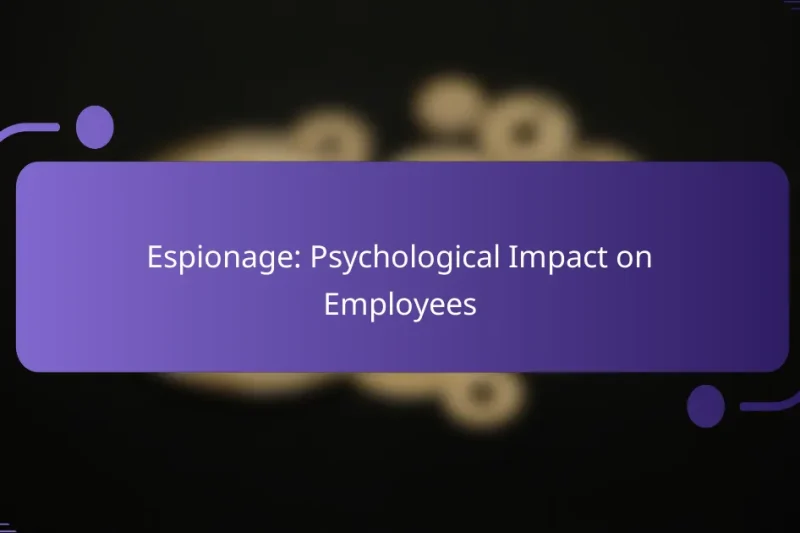Espionage plays a crucial role in providing a competitive advantage within technology sectors by allowing companies … Espionage: Competitive Advantage in Technology SectorsRead more
Impact of Espionage on Business Operations
Espionage poses a significant threat to business operations by compromising sensitive information and undermining strategic initiatives. Companies face challenges such as financial losses, reduced competitive advantages, and reputational damage due to unauthorized information acquisition. Implementing robust security measures and employee training can help mitigate these risks and safeguard vital assets.
Espionage: Financial Impact on Small Businesses
Espionage poses a significant threat to small businesses, leading to direct financial losses and increased operational … Espionage: Financial Impact on Small BusinessesRead more
Espionage: Role of Corporate Governance in Prevention
Corporate governance is essential in mitigating the risk of espionage by implementing robust policies and practices … Espionage: Role of Corporate Governance in PreventionRead more
Espionage: Strategies for Risk Mitigation
In today’s interconnected world, organizations face significant risks from espionage that can compromise sensitive information and … Espionage: Strategies for Risk MitigationRead more
Espionage: Psychological Impact on Employees
Espionage poses a significant threat to employee mental health, fostering an atmosphere of fear and uncertainty … Espionage: Psychological Impact on EmployeesRead more
Espionage: Effectiveness of Insurance for Businesses
In an increasingly competitive landscape, businesses face significant risks from espionage, making insurance a vital tool … Espionage: Effectiveness of Insurance for BusinessesRead more
Espionage: Long-Term Consequences for Brand Reputation
Espionage poses a significant threat to brand reputation, particularly in the United States, where consumer trust … Espionage: Long-Term Consequences for Brand ReputationRead more
How does espionage affect business operations in the United States?
Espionage significantly impacts business operations in the United States by compromising sensitive information and disrupting strategic initiatives. Companies face various challenges, including financial losses, diminished competitive advantages, and damage to their reputations.
Financial losses from data breaches
Data breaches resulting from espionage can lead to substantial financial losses for businesses. Costs may include direct expenses for remediation, legal fees, and potential fines, which can range from thousands to millions of dollars depending on the severity of the breach.
Additionally, companies may experience indirect losses due to operational disruptions and decreased productivity. Affected businesses often face increased cybersecurity investments to prevent future incidents, further straining their budgets.
Impact on competitive advantage
Espionage can erode a company’s competitive advantage by exposing proprietary information and trade secrets to rivals. When competitors gain access to sensitive data, they can replicate products or strategies, undermining the original company’s market position.
To mitigate this risk, businesses should invest in robust security measures and employee training to protect confidential information. Regular assessments of competitive threats can also help organizations stay ahead of potential espionage attempts.
Reputation damage
The fallout from espionage can severely damage a company’s reputation. Customers and partners may lose trust in a business that has been compromised, leading to a decline in sales and partnerships.
To rebuild trust, companies must communicate transparently about the breach and the steps taken to address it. Implementing strong cybersecurity practices and demonstrating a commitment to protecting customer data can help restore confidence over time.
What are the common types of espionage targeting businesses?
Common types of espionage targeting businesses include corporate and industrial espionage, both of which involve the unauthorized acquisition of sensitive information. These activities can severely impact a company’s competitive edge and financial stability.
Corporate espionage
Corporate espionage involves the theft of confidential information from a business to gain a competitive advantage. This can include trade secrets, marketing strategies, and customer lists, often carried out by competitors or insiders.
To mitigate risks, companies should implement strict access controls and regularly train employees on security protocols. Regular audits and monitoring can help identify potential vulnerabilities before they are exploited.
Industrial espionage
Industrial espionage focuses on stealing proprietary technologies or processes from companies, often in sectors like manufacturing or technology. This type of espionage can involve hacking, bribery, or even physical infiltration to gather sensitive data.
Businesses should invest in robust cybersecurity measures, including firewalls and encryption, to protect their intellectual property. Establishing clear reporting channels for suspicious activities can also help in early detection and prevention of espionage attempts.
What strategies can businesses implement to mitigate espionage risks?
Businesses can implement several strategies to effectively mitigate espionage risks, focusing on employee training, cybersecurity measures, and regular security audits. These strategies help create a secure environment that deters potential threats and protects sensitive information.
Employee training programs
Employee training programs are essential in raising awareness about espionage risks and promoting a culture of security. Regular workshops and seminars can educate staff on recognizing suspicious behavior, secure handling of sensitive information, and reporting protocols.
Consider incorporating role-playing scenarios and real-life case studies to make training more engaging and relatable. Ensure that all employees, from entry-level to executives, participate in these programs to foster a unified approach to security.
Advanced cybersecurity measures
Implementing advanced cybersecurity measures is crucial for protecting digital assets from espionage. This includes using strong encryption for sensitive data, multi-factor authentication for access control, and regularly updating software to patch vulnerabilities.
Employing intrusion detection systems can help monitor network traffic for unusual activities. Additionally, consider conducting penetration testing to identify weaknesses in your cybersecurity framework and address them proactively.
Regular security audits
Regular security audits help businesses assess their current security posture and identify potential gaps in their defenses against espionage. These audits should include both physical security assessments and evaluations of digital systems.
Establish a schedule for audits, ideally on a quarterly basis, and involve third-party experts for an unbiased perspective. Use the findings to update security policies and procedures, ensuring that your organization remains resilient against evolving threats.
How do laws and regulations address business espionage?
Laws and regulations play a crucial role in addressing business espionage by providing legal frameworks to protect trade secrets and penalize unlawful actions. These laws help businesses safeguard their confidential information and promote fair competition in the marketplace.
Defend Trade Secrets Act
The Defend Trade Secrets Act (DTSA) was enacted in the United States to create a federal cause of action for trade secret misappropriation. This law allows businesses to file civil lawsuits in federal court for the theft of trade secrets, providing a more uniform approach across states.
Under the DTSA, companies can seek damages, including actual losses and unjust enrichment, as well as punitive damages in cases of willful and malicious misappropriation. It is essential for businesses to implement reasonable measures to maintain the secrecy of their trade secrets to qualify for protection under this act.
Economic Espionage Act
The Economic Espionage Act (EEA) criminalizes the theft or misappropriation of trade secrets for commercial advantage. This law allows for both civil and criminal penalties, making it a powerful tool against corporate espionage.
Violations of the EEA can lead to severe consequences, including hefty fines and imprisonment for individuals involved. Companies should be aware of the EEA when developing their security protocols and ensure compliance to protect their intellectual property effectively.
What role does technology play in business espionage?
Technology plays a crucial role in business espionage by enabling the collection, analysis, and transmission of sensitive information. Tools such as surveillance software and data encryption technologies are commonly used to either perpetrate or defend against espionage activities.
Use of surveillance software
Surveillance software is designed to monitor and capture data from computers, networks, and mobile devices. This type of technology can record keystrokes, take screenshots, and track online activity, making it a powerful tool for corporate espionage.
Businesses should be aware of the potential for such software to be used against them. Implementing strong security measures, such as employee training and regular audits, can help mitigate risks associated with unauthorized surveillance.
Data encryption technologies
Data encryption technologies protect sensitive information by converting it into a format that is unreadable without the correct decryption key. This is vital for safeguarding trade secrets and proprietary data from espionage attempts.
Organizations should adopt encryption standards such as AES (Advanced Encryption Standard) to secure their data both in transit and at rest. Regularly updating encryption protocols and educating employees about their importance can significantly reduce the risk of data breaches.
How can businesses recover from espionage incidents?
Businesses can recover from espionage incidents by implementing a structured response plan, assessing the damage, and reinforcing security measures. Recovery involves not only addressing immediate threats but also rebuilding trust with stakeholders and ensuring future resilience.
Incident response planning
Incident response planning is crucial for businesses to effectively manage espionage incidents. A well-defined plan outlines the steps to take when a breach occurs, including identifying the source, containing the threat, and notifying affected parties. This proactive approach minimizes damage and helps maintain operational continuity.
Key components of an incident response plan include establishing a response team, defining roles and responsibilities, and creating communication protocols. Regular training and simulations can prepare staff to respond efficiently, reducing reaction times during actual incidents.
Businesses should also consider integrating their incident response plan with existing security frameworks, such as ISO 27001 or NIST standards. This alignment ensures comprehensive coverage of security measures and compliance with relevant regulations, enhancing overall resilience against espionage threats.






